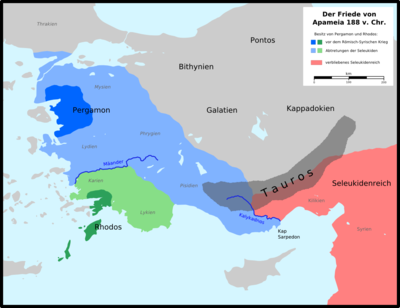معاهدة أفاميا
معاهدة أفاميا Treaty of Apamea في 188 ق.م.، كانت معاهدة سلام بين الجمهورية الرومانية و أنطيوخس الثالث، حاكم الامبراطورية السلوقية. وقد أُبرمت بعد انتصارات الرومان في معركة ثرموپيلاي (في 191 ق.م.)، في معركة ماغنسيا (في 190)، وبعد الانتصارات البحرية للرومان والرودسيين على البحرية السلوقية.
كانت المعركة كارثية للسلوقيين، وأُجبـِر أنطيوخس على الرضوخ لشروط. ومن بنود معاهدة أفاميا، كان على أنطيوخس دفع 15,000 تالنت (450 طن) من الفضة كعقوبة حرب، كما أُجبر على التخلي عن الأراضي غرب جبال طوروس. اكتسبت رودس السيطرة على كاريا ولوقيا، بينما حصل الپرگام على شمال لوقيا وكل أراضي أنطيوخس الأخرى في آسيا الصغرى.
. . . . . . . . . . . . . . . . . . . . . . . . . . . . . . . . . . . . . . . . . . . . . . . . . . . . . . . . . . . . . . . . . . . . . . . . . . . . . . . . . . . . . . . . . . . . . . . . . . . . . . . . . . . . . . . . . . . . . . . . . . . . . . . . . . . . . . . . . . . . . . . . . . . . . . . . . . . . . . . . . . . . . . . .
بنود المعاهدة
The treaty, according to Appian, obliged Antiochus III to abandon Europe altogether and all of Asia west of the Taurus Mountains. He had to surrender all the war elephants in his possession and was limited to twelve warships for the purpose of keeping his subjects under control, but he was allowed to build more if he was attacked. Antiochus was barred from recruiting mercenaries "north of the Taurus" (that is, from territory just ceded to Roman allies Pergamon and Rhodes) and entertaining fugitives from the same. Antiochus had to give twenty hostages, whom the Roman consul would select. The hostages should be changed every third year, except the son of Antiochus. In the future, he would maintain no elephants. The Seleucids were forced to pay an indemnity of 15,000 talents of silver of debt: 500 Euboic talents immediately, 2,500 more when the Roman Senate ratified the treaty, and installments of 1,000 talents each to be delivered to Rome annually for the next twelve years. The Seleucids also agreed to an indemnity of 540,000 modii of corn. He was also forced to surrender all prisoners and deserters to his enemies, and to Eumenes II, the King of Pergamon, whatever remains of the possessions he acquired by his agreement with Attalus I, the father of Eumenes.
Rome gave the control of a large part of Asia Minor to Eumenes. Antiochus kept the region of Cilicia, while most of Lycia and Caria became part of the Rhodian Peraia. Hellenistic kings generally accepted, for their own lifetimes, any treaty they had signed, on the grounds of honour. On the other hand, their heirs did not feel honour bound to accept treaties signed by their predecessors. The naval conditions of the treaty appear to have fallen into abeyance, but the other conditions held.
The treaty was formalized at Apamea in Phrygia. It allowed the Romans to expand their political hegemony to the Eastern Mediterranean Sea. But at this time Roman power was still indirect, and Rome depended on its capacity to ally itself to second-rank powers such as Pergamon and Rhodes. The harsh reparations weakened the Seleucid Empire, causing a shortage of money and weakening the ability of the Seleucids to manage their kingdom.[1]
التاثير اللاحق
Rome used the threat of a renewed war to check Seleucid power from reasserting itself in the region. In the Sixth Syrian War, Rome insisted that the Seleucids leave the Ptolemaic Empire alone after occupying much of Egypt and Cyprus in 168 BC; Seleucid king Antiochus IV grudgingly accepted. Polybius's Histories records that as late as 162 BC, a Roman delegation visited Antioch, and used the Treaty as an excuse to hamstring Seleucid war elephants and destroy Seleucid ships as being in violation of the terms of the treaty.[2][3]
المراجع
- ^ Gera, Dov. Judaea and Mediterranean Politics, p. 93. Cited in Portier-Young, p. 79
- ^ Bar-Kochva, Bezalel (1989). Judas Maccabaeus: The Jewish Struggle Against the Seleucids. Cambridge University Press. p. 547–548. ISBN 0521323525.
- ^ Polybius. Histories, Book 31.
المصادر
- پوليبيوس من مگالوپولس, تاريخ العالم, 21.42: نص المعاهدة
- Appian of Alexandria, Syriaca, 39: text of the treaty
- Titus Livy, Ab Urbe Condita, 38:
